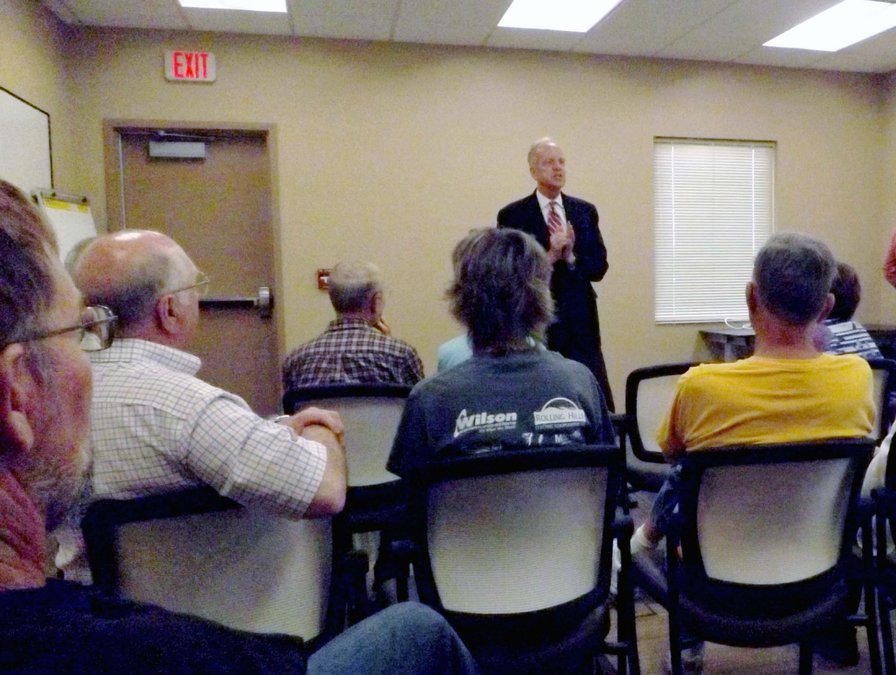Sen. Jerry Moran (R-Kansas) visited Larned and Great Bend on Friday to hear from constituents and to make sure veterans know about a program that goes into effect on June 6.
The stops were part of his latest Kansas Listening Tour, with stops planned in 105 counties.
Moran said he will visit Dodge City on Monday and then attend a Memorial Day ceremony at the Fort Dodge Soldiers Home.
“Choice” program improved
In 2014, Congress established the Veterans Choice Card Program, which allowed veterans who live more than 40 miles from the closest VA facility, or who face significant delay in scheduling an appointment, to access non-VA care. On June 6, Moran said, the law will change to veterans’ benefit. Choice will become the VA Mission Act.
“We’ve been trying to get the VA to provide services at home more,” Moran told an audience of two dozen people at The University of Kansas Health System Great Bend Campus. “Choice helped but the VA went out of its way to make things difficult.” The late Sen. John McCain and Moran worked on this act, which President Trump signed last year. The new rules allow health care outside of a VA facility “if it’s in the best interest of the patient.”
This will be more accessible than in the past because, “the provider decides what’s in the best interest of the patient, not the administration,” he added.
As an example of how this is better, Moran said a veteran in Bonner Springs will be allowed to get a kidney transplant at the University of Kansas Medical Center in Kansas City instead of having to travel to the east coast.
Local access will also be available for mental health care, and the change will allow for increased use of telemedicine, he said.
“I want this to work,” Moran said. He noted that veterans can’t just show up at a hospital or clinic, however. “It has to start with a referral from the VA.”
While one audience member said the current system is flawed and he continues to have trouble getting local health care and medication, another man said he is happy with the service the VA provides. “Associate yourself with an association like the DAV (Disabled American Veterans),” he advised. “If the initial paperwork is completed properly, it expediates a lot of problems.”
“Many of our veterans are happy with the service they receive,” Moran agreed. “Our point is there are veterans that have a different experience.”
Health Care
Moran also fielded questions from the audience about health care costs, international trade, climate change and border security, with a word on tensions in the Middle East.
“I didn’t support the Affordable Care Act,” Moran said. “The problem is, it’s not affordable.” The senator said the focus should be how to drive down health-care costs instead of who can pay for someone else’s health care.
Although bills to dismantle “Obamacare” and stop surprise medical bills are queued up for the senator returns to Washington, Moran said, “I’m pessimistic about the mood and nature of Congress.” He added, “To Kansans, this isn’t politics. People can’t afford insurance. This is a very personal thing — it is a personal issue about people’s lives.”
International trade
An area agriculture producer wanted to know about trade with Cuba. Moran talked about that and the United States-Mexico-Canada Agreement (USMCA), as well as the trade war with China. He said tariffs and not having trade agreements directly affects Kansas farmers and businesses.
Of the USMCA, which is awaiting approval in the House of Representatives, Moran said, “this may be the most important thing we can do for Kansans — to make sure we have access to trade with Mexico and Canada. ... My view is we need every market.”
On a trade war with China, Moran said, “this trade battle can’t last much longer; Kansas farmers can’t hang in there much longer. ... Our economy is in jeopardy. What Jerry Moran is about, what’s in his heart, is how can we save rural America for the next generation?” In turn, he asked, “Once you lose a customer (due to trade restrictions or tariffs), how do you get them back?”
The president’s announcement Thursday of a $16 billion farm aid package to offset losses from the U.S. trade war with China “is a drop in the bucket compared to the losses due to from not exporting,” he said.
Climate change
When asked what the federal government is doing to combat climate change and what has he done, Moran answered, “I think science is to be believed; the climate is changing.” He said he would defer to scientists to determine the cause and solution, but he is working to support a diverse energy supply. “I’m an Arbor Day guy,” he said.
Border security/international security
A question by a woman who expressed concern about what’s happened at the border and whether the United States could concentrate on helping Central American countries led to an answer about international concerns. Moran said he attended a classified briefing Thursday on Iran.
“I’m very reluctant for us to engage in a military battle anywhere, and especially in the Middle East,” he said. Maybe the president and others are just saber rattling, he said, but if there is a war, “Congress needs to be the ones to declare war.”
Closer to home, Moran said the U.S. should put excess grain into international feeding programs. He continued, “I generally think we need a more secure border than we have.” He plans to visit the Mexican border this week to view the situation first-hand.
Moran said he supports the “DACA fix. I’ve tried to package it with border security. So far, the environment in Washington, D.C., hasn’t produced that result.”







